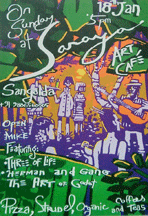by Tony Fernandes
Once upon a time there lived a little boy in a small village with his mother. His father worked very far away and wrote home every month on a regular basis. "My father will return home some day", the boy thought, as he longed to see him. He looked at his dad's photograph everyday on his study table, a picture that was probably taken many years ago.
Then one late afternoon the postman came along with a letter from his father. The letter was addressed to his mother. He noticed there was a smile on her mother's face as she read the letter....it was a letter letting mother know of his arrival date. The little boy’s joy knew no bounds when she told that his father was due to arrive in a few days.
It was one fine day in mid-April. In the distance he saw him trudging along his suitcase with a bag slung over his shoulder. Smiling away he ran towards him. His father put his suitcase down, lifted, hugged and kissed the boy, who noticed a tear running down his father’s cheek. Wait till I tell mother about this, only children cry, he reflected. By then a neighbour had already hurried and reached up to them as well and helped his father with his suitcase.
Lifting his son and carrying him in the crook of his arm, and holding the bag with the other, he started to walk on the pathway leading towards their house. In the meantime his mother was on her way to greet him. He noticed his mother wiping a tear away too. “Why is everybody crying” the boy thought to himself, “when today is the happiest day of my life.”
“You have grown so big” his father said to the boy, who slid down as he stepped into the balcão. He sat down on the wooden bench while he laid the bag on the ground, wiping the sweat off his face with his handkerchief. Or were they again tears too, the boy wondered!
In the meantime, some of the neighbours had gathered to meet his father. Almost everyone went on to ask him something or the other. “How was the journey?” “Was the sea very rough?” “Will you be here with us for two months at least, Uncle?” “Why was the steamer delayed?”
The boy’s mother then lifted the suitcase to haul it inside while the rest continued talking outside in the small balcão of their house. Seeing her trying to lift the luggage, a village youth instantly ran to help her, saying: "Leave it to me, Aunty, I will take it inside. Just let me know where I should place it".
“We will go to the ‘praia’ today,” somebody suggested from the group of village folks who had assembled there in the courtyard. “Yes, yes, we must go to the sea-shore, uncle, you must come with us” said another. “Uncle is very tired and fatigued from the journey, let him rest today, we will go to the beach tomorrow or some other day” said an elderly man. And invariably they all agreed. The little boy did not say anything as he foresaw this was a good opportunity to have some time alone with his Dad.
Fun-filled days, that the boy had so anxiously looked forward to, would now follow, he thought. There would be many happy days ahead for him and for everyone else in the village. And other folks in his small village hoped the same too; a father, a husband or relative who would arrive in the following week or two to spend their holidays with their families. The entire village would then be vibrant and filled with joy. He had a lot of things to look forward to: picnics, weddings, litanies in homes and in village chapels, litanies at the crosses by the trodden paths through the fields and at the road-side crosses too. As darkness fell, during some evenings shortly after the Angelus prayers the young folks got together singing mando, durpod and all the popular hits in Konkani, Portuguese and English.
But soon those happy days would end too. Soon his father would have to leave and sail again to return to his job. The boy immediately tried to cast these thoughts away from his mind. But they kept on coming back to him. "My father has just arrived, but why am I thinking about this, there are lot of good times I have to think about", the little boy thought, sitting alone quietly in a corner with tears in his eyes.
But he soon realized that the holidays seemed to have passed by so quickly. Finally the day had come, a day that was so different from the one when his father arrived two months before. This was a sad day - this was the day when the ship set sail. The taxi driver from the adjoining village had come to fetch them early in the morning. The boy, his mother and a fellow village couple, who had always been their best friends, accompanied his father to the pier by the riverside of the capital city to bid him adieu. Looking into his father’s eyes he had sensed his reluctance to board. But his departure was inevitable and soon the hugs and kisses were brought to a halt with the booming siren of the ship.
The time had finally come for his father to board the ship. The boy saw him looking back and waving out to him as he climbed up the ramp leading to the ship and then again from the deck as the gleaming white ship set sail. The ship started moving gradually away from the pier. He waved back continuously till the ship grew smaller and smaller in the distance. Lost in his thoughts, he felt a hand over his shoulder. Then suddenly he was startled when he heard his mother’s voice say, “Son, don’t cry, your father will come back soon.” “He cannot be with us all the time, he will return shortly”. The boy remained quiet and still kept looking towards the ship on the horizon till he could see it no more.
It was evening when they returned to the village. The house was very quiet, somber and still. It was then that the void grew more apparent. Everything in the house seemed to be at a standstill.
“When I grow big, I too will go to work and bring you lot of things” the boy told his mother just after the evening Rosary prayer before supper time, as he glanced towards the toy on the shelf his father had brought for him. It was a wooden toy soldier. He realized he had not cared much for it during the preceding hectic two months when his father was around. He was unaware of the significance of this wooden toy soldier would bear in the years to come. The evening wore on slowly and seemed endless. The church bell rang the eight o'clock nightly call for prayers. And finally after having their supper they sat in the balcao for a while. And later saying his daily night prayers the boy fell asleep.
He woke up rather early the following morning and the first thought that came to his mind was whether his father had reached Bombaim. His mother was already up preparing tea by the fireside. She was looking into the fire as she tossed small pieces of wood into the burning embers. She seemed very quiet and sad. He wondered what she might be thinking of. He saw the fire reflected in the glint of tear in her eye which saddened him. Perhaps she was also thinking about his father. Now, it was his turn to give some precious advice: “Don’t cry, mother”, the boy said. “Dad will return. He has gone to work far away, but he will certainly be back soon.”
The long shadows of the trees on clear ground in front of their house grew smaller as the sun rose. Everything seemed quite and serene around in the village. That morning sitting on the front porch, sipping his tea, the boy reflected on the previous two months when the whole village had been so vibrant.
He wondered how he could ever forget the good things he enjoyed and how much he would miss his father. He remembered that some time ago his mother had told him that his father would return home one day for good. When would that day come?
His father had taken him everywhere, visiting new places to see and explore, to the beach, to the market place every day to buy fresh fish and groceries, to his favourite restaurant in town for ice-cream, to the hills for walks, to pluck 'canttam' and 'cashew apples', to the lakes and springs for picnics, and to nearby streams for a swim. He had made for him his very own first mini 'robond'. He had also taken him fishing to the salt-water river, for football games in the nearby town, and to distant places visiting friends and relatives, by bus, taxi and ferry, all of which he had enjoyed immensely.
The boy’s father had also taken him along when he had gone to meet the Capuchin Friars at his school, nestled high up on the hill among the verdant surroundings. They had walked their way up. On their way back they had stopped to pluck ripe cashews from the trees that grew on the slopes of the hill. It had been a great fun-filled day although the climb was very tiring. They had made a brief stop at the shop down the hill for a soda, a real thirst-quencher. They had walked back home on the winding path through the picturesque village. His father greeted the people he knew along the way. He also waved out to the people who worked in the fields. "My Dad knows everybody, or so it seems" the boy had thought.
Almost lost in his thoughts, sitting there he realized that soon his summer holidays would end too, and he himself would shortly be busy with his school studies again. He would have to leave all the thoughts of the good times of fun and play behind him. As he sat there he could see his alma mater in the distance, right on the top of the hill. All the boys from his village walked up to study there. Very shortly the great times that he had enjoyed and shared with the people in his village would only perhaps be a nostalgic memory. A holiday that was filled with fun was nearing its end.
In the following years as the boy grew up, his father had come home on leave every year and brought him more toys. Similar enjoyable holidays had followed, but for years the wooden TOY SOLDIER stood silently on the shelf, like a sentinel guarding a town, occupying that space on the shelf with its fixed gaze towards the opposite wall and seemingly looking through and beyond it, into the distant hills, staring into a future he never knew, while conveying an important message.
As the boy grew older, he often reminisced about his father, and through his own uncertainties and obstacles, he found strength in the thought of the wooden toy soldier his father had given him, motionless yet hardy, strong, protective and inspiring. As he grew up, he realized that he had looked at that toy soldier more than he had played with it, perhaps in an unconscious effort to preserve it, and in turn replace the absence of his father. There were many times when he would take it down from the shelf, dust it and put it back in its apparent rightful place.
But unlike that idle wooden toy soldier on the shelf my own dad was a real life soldier. He worked hard in his life, cared, loved and did the best that he possibly could for his family. He stood tall against all odds and provided me with hope and inspiration, successfully setting an example to march on through my own.
Tony Fernandes
*Canttam*, a berry-like black-coloured local fruit found wild on Goa's hills.
*Robond*, a locally-made catapult, which children would play with in Goa, made from a v-shaped tree branch and waste automobile or cycle tubes.
*Praia*, Port. (beach)
*Mando**Dulpod* Konkani Folk Songs
*balcão
Tony Fernandes
| < Prev | Next > |
|---|
















